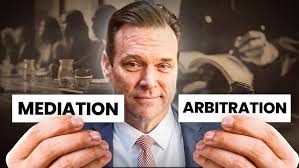

Effective Solutions: How Mediation and Arbitration Transform Debt Recovery
Introduction
Mediation And Arbitration In Debt Recovery;
Debt recovery is a critical aspect of financial stability for businesses and individuals. When debts remain unpaid, creditors face significant financial strain, which can affect their operations, profitability, and overall financial health. Traditional litigation has long been the primary method for resolving debt disputes. However, it is often costly, time-consuming, and adversarial, leading many to seek alternative dispute resolution methods. Among these alternatives, mediation and arbitration stand out as effective, efficient, and less confrontational approaches to debt recovery.
In the complex world of commercial transactions and business dealings, debt recovery remains a pressing challenge for many individuals, corporate entities, and financial institutions. The traditional litigation route, while effective in certain cases, is often fraught with delays, high legal costs, and procedural technicalities that make it less appealing for swift resolution. As economic activities grow and financial obligations multiply, the need for quicker, cost-effective, and relationship-preserving methods of recovering debts becomes increasingly important.
This has led to a significant shift toward alternative dispute resolution (ADR) mechanisms such as mediation and arbitration, which now play a central role in settling debt disputes outside the courtroom. The growing preference for these methods highlights a broader trend in the legal landscape that favors efficiency and practicality in dispute resolution.
Mediation and arbitration in debt recovery have emerged as transformative tools, offering not only time-saving and financial advantages but also preserving business relationships that may otherwise be damaged through prolonged court battles. Mediation, by its nature, involves a neutral third party who facilitates discussions between the debtor and creditor, helping them arrive at a mutually acceptable resolution. It is particularly useful in situations where the parties wish to continue doing business or maintain some level of cordiality after the dispute.
Arbitration, on the other hand, provides a more formal structure but still operates outside the courtroom. An arbitrator hears both sides and makes a decision that is usually binding, offering a finality similar to court judgments but with significantly less procedural baggage.
These ADR mechanisms are increasingly being incorporated into contractual agreements, particularly in commercial sectors, as parties now recognize their benefits. A properly drafted arbitration clause in a contract can streamline the resolution process when disputes arise. Moreover, courts in many jurisdictions, including Nigeria, now support and even encourage the use of ADR to decongest their dockets and foster quicker access to justice.
The role of institutions such as the Lagos Multi-Door Courthouse and the Nigerian Institute of Chartered Arbitrators has been pivotal in promoting and institutionalizing these alternatives to litigation. This evolution demonstrates that mediation and arbitration are not merely options but have become integral parts of the legal framework in handling debt recovery matters.
Understanding how these mechanisms work in the context of debt recovery requires an appreciation of the legal and practical dimensions involved. It is essential to examine how disputes arise, how parties can be encouraged or compelled to enter into ADR processes, and how enforceable outcomes are guaranteed.
For instance, in cases of mediation, the final agreement reached may be documented and signed by the parties, forming a binding contract that can be enforced in court if necessary. In arbitration, the award rendered by the arbitrator has the weight of a court judgment and can be registered in a court for enforcement. These assurances of enforceability make ADR a powerful tool in the hands of creditors who want to avoid the lengthy litigation route but still achieve legal redress.
Mediation and arbitration also play a key role in cross-border debt recovery. In international commercial transactions, parties are often from different legal jurisdictions, making litigation even more cumbersome due to conflicts of laws and jurisdictional challenges.
International arbitration provides a neutral ground, and awards made under conventions such as the New York Convention are recognized and enforceable in multiple countries. This global applicability of arbitration makes it particularly suitable for multinational companies and investors operating in Nigeria and across Africa who need reliable mechanisms for resolving financial disputes.
In Nigeria, the legal system has embraced ADR, and there is a growing body of case law and statutory provisions supporting its use. For example, the Arbitration and Mediation Act, 2023 has consolidated Nigeria’s commitment to alternative dispute resolution, setting out detailed procedures and giving legislative backing to practices that were previously developed through institutional rules and judicial support. These developments have created an environment where parties can confidently choose ADR without fear of legal uncertainty or unenforceability.
From a strategic standpoint, mediation and arbitration also allow parties to retain some level of control over the process and the outcome. In litigation, the matter is entirely in the hands of the court once it is filed, and the adversarial nature of proceedings often escalates tensions between parties. ADR mechanisms, in contrast, allow for a more collaborative and confidential resolution process, often resulting in outcomes that both sides can live with. This collaborative nature is especially important in debtor-creditor relationships where a rigid “winner takes all” approach may not be commercially wise.
Ultimately, the choice of mediation and arbitration in debt recovery should be seen as part of a broader risk management strategy. Creditors who incorporate ADR clauses in their contracts, maintain open communication channels with debtors, and engage skilled mediators or arbitrators stand a better chance of recovering debts with minimal disruption to their operations. Conversely, debtors who are proactive in negotiating settlements through ADR mechanisms may avoid damaging judgments and credit ratings. Thus, the utility of mediation and arbitration transcends legal considerations; it also encompasses economic and relational dimensions that traditional litigation often overlooks.
As we delve deeper into this topic, we will explore the mechanisms, advantages, challenges, and real-world applications of mediation and arbitration in debt recovery. The objective is to provide a clear understanding of how these tools can be effectively used to resolve debt disputes, mitigate losses, and promote justice in commercial relationships.
Understanding Mediation
Mediation is a voluntary process in which a neutral third-party mediator assists the disputing parties in reaching a mutually acceptable resolution. Unlike a judge or arbitrator, the mediator does not impose a decision but facilitates communication and negotiation between the parties.
Key Features of Mediation
Voluntary Participation: Both parties must agree to participate in mediation. This voluntary nature often leads to more amicable resolutions, as both parties are willing to find a solution.
Neutrality: The mediator is an impartial facilitator who does not take sides or have any stake in the outcome. This neutrality helps build trust and encourages open communication.
Confidentiality: Mediation sessions are private and confidential, ensuring that any information disclosed during the process cannot be used later in court. This confidentiality encourages parties to be more open and honest in their discussions.
Control and Flexibility: The parties retain control over the outcome, as they work together to reach a resolution. This flexibility allows for creative solutions tailored to the specific needs and interests of both parties.
The Mediation Process
1. Initiation: Mediation begins with the agreement of both parties to participate. They select a mediator, often with expertise in debt recovery or related legal fields.
2. Preparation: The mediator meets with each party separately to understand their perspectives, issues, and desired outcomes. This helps the mediator identify common ground and potential areas for compromise.
3. Joint Sessions: The mediator brings both parties together for joint sessions. During these sessions, the mediator facilitates discussions, encourages open communication, and helps the parties explore potential solutions.
4. Negotiation: The mediator guides the negotiation process, helping the parties to focus on their interests rather than positions. This interest-based negotiation often leads to more sustainable and satisfactory agreements.
5. Resolution: If the parties reach an agreement, the mediator helps them draft a settlement agreement. This agreement is then signed by both parties and can be legally binding, depending on the jurisdiction and the terms of the agreement.
Understanding Arbitration
Arbitration is another form of alternative dispute resolution where a neutral third-party arbitrator hears the evidence and arguments from both parties and makes a binding decision. It is often viewed as a more formal process compared to mediation, resembling a simplified version of a court trial.
Key Features of Arbitration
Binding Decision: The arbitrator’s decision, known as an award, is usually final and binding on both parties. This decision can be enforced by courts, providing a clear resolution to the dispute.
Expert Arbitrators: Arbitrators are often experts in the specific area of dispute, such as debt recovery. Their expertise ensures that the decision is informed and relevant to the particular issues at hand.
Flexibility and Efficiency: While more structured than mediation, arbitration is generally faster and more flexible than traditional litigation. The parties can agree on procedural rules, timelines, and other aspects of the process.
Confidentiality: Like mediation, arbitration proceedings are private, and the details of the case are not disclosed publicly. This confidentiality can be particularly important in sensitive financial disputes.
The Arbitration Process
1. Agreement to Arbitrate: Arbitration begins with an agreement between the parties to submit their dispute to arbitration. This agreement can be part of a contract clause or a separate agreement after the dispute arises.
2. Selection of Arbitrator: The parties choose an arbitrator or a panel of arbitrators. This selection is crucial, as the arbitrator’s expertise and impartiality are vital for a fair resolution.
3. Preliminary Hearing: The arbitrator conducts a preliminary hearing to set the procedures, timelines, and other logistical aspects of the arbitration. This hearing helps streamline the process and address any preliminary issues.
4. Exchange of Information: The parties exchange relevant documents and information, similar to the discovery process in litigation but usually more limited in scope. This exchange ensures that both parties have access to the necessary evidence.
5. Hearing: During the arbitration hearing, both parties present their evidence and arguments. The arbitrator may ask questions and request additional information to fully understand the case.
6. Award: After considering the evidence and arguments, the arbitrator issues a written decision, known as an award. This award is binding on the parties and can be enforced by courts if necessary.
Advantages of Mediation and Arbitration in Debt Recovery
Mediation and arbitration offer several advantages over traditional litigation in the context of debt recovery:
Cost-Effectiveness: Both mediation and arbitration are generally less expensive than litigation. Mediation often resolves disputes quickly, reducing legal fees and other associated costs. Arbitration, while more formal, still tends to be more cost-effective than a prolonged court battle.
Speed: Mediation and arbitration can resolve disputes much faster than litigation. Mediation sessions can often be scheduled promptly, and arbitration hearings typically follow a more expedited timeline compared to court proceedings.
Preservation of Relationships: The collaborative and less adversarial nature of mediation helps preserve business relationships that might otherwise be damaged by contentious litigation. Even arbitration, though more formal, tends to be less adversarial than court trials.
Flexibility: Mediation allows for creative solutions tailored to the specific needs and interests of the parties. Arbitration offers procedural flexibility, allowing parties to customize aspects of the process to suit their needs.
Confidentiality: The private nature of mediation and arbitration ensures that sensitive financial information and business practices remain confidential, protecting the parties’ reputations and business interests.
Expertise: The ability to choose mediators or arbitrators with specific expertise in debt recovery ensures that the resolution process is informed and relevant to the particular issues at hand.
Challenges and Considerations
While mediation and arbitration offer significant benefits, there are also challenges and considerations to keep in mind:
Voluntary Nature of Mediation: The success of mediation depends on the willingness of both parties to participate and compromise. If one party is unwilling to engage in good faith, mediation may not be effective.
Binding Nature of Arbitration: While the binding nature of arbitration can provide a clear resolution, it also means that the parties have limited recourse to appeal the decision. This finality can be a disadvantage if the arbitrator makes a decision that one party believes is unjust.
Costs of Arbitration: Although generally less expensive than litigation, arbitration can still be costly, particularly if a panel of arbitrators is used or if the process becomes prolonged.
Enforceability: While arbitration awards are generally enforceable, enforcing mediation agreements can be more complex if the agreement is not made binding. Parties should ensure that mediation agreements are properly documented and, if necessary, made enforceable by courts.
Conclusion
Mediation and arbitration represent valuable alternatives to traditional litigation in the context of debt recovery. Their cost-effectiveness, speed, flexibility, confidentiality, and the ability to preserve relationships make them attractive options for resolving debt disputes. However, the success of these methods depends on the willingness of parties to engage in good faith and the careful selection of skilled mediators and arbitrators. By understanding the features, processes, and advantages of mediation and arbitration, parties can make informed decisions that align with their goals and interests, ultimately leading to more effective and satisfactory debt recovery outcomes.
The adoption of mediation and arbitration in debt recovery is more than a legal trend; it represents a paradigm shift in how financial disputes are approached and resolved. In today’s fast-paced commercial environment, where time is money and relationships are critical, the traditional litigation model increasingly falls short of meeting the needs of parties engaged in debt-related disputes. Mediation and arbitration offer alternatives that are not only efficient and cost-effective but also imbued with flexibility and confidentiality—traits that modern commercial actors highly value. These methods align better with the realities of business transactions, where preserving partnerships and maintaining business continuity often matter just as much as recovering funds.
Reflecting on the effectiveness of these dispute resolution mechanisms, it is clear that mediation and arbitration offer a more humane, personalized, and adaptable path to justice. Unlike the rigid and sometimes punitive nature of courtroom battles, mediation allows for understanding, reconciliation, and creative problem-solving. In cases where debts arise from misunderstandings, unforeseen economic downturns, or miscommunication, mediation creates a platform for resolution without acrimony. The involvement of a neutral third party encourages transparency, helps level power imbalances, and fosters solutions tailored to the specific needs of both the debtor and the creditor.
Arbitration, while more structured than mediation, is equally transformative. It provides finality without the burdensome appeals that characterize court judgments. For high-stakes or complex debt recovery cases—particularly those involving sophisticated contracts or international elements—arbitration delivers legal certainty in a manner that can rival, if not surpass, the courtroom experience. The use of expert arbitrators who understand commercial dynamics ensures that decisions are not only legally sound but commercially sensible. Furthermore, the global enforceability of arbitral awards enhances their appeal in cross-border transactions, providing an indispensable tool for international creditors.
The integration of ADR clauses into contractual agreements is no longer an optional feature but a necessity in the modern business toolkit. Lawyers and commercial drafters must now proactively incorporate clear dispute resolution frameworks into agreements, recognizing that this not only speeds up enforcement but also signals professionalism and preparedness. Businesses that ignore these ADR options risk losing valuable time and money in avoidable litigation, and may ultimately damage relationships that could have been salvaged through more conciliatory processes. The future of debt recovery lies in foresight and planning, and ADR is at the heart of this proactive legal culture.
Legal systems, including that of Nigeria, have increasingly made space for ADR to thrive. Legislative reforms and institutional innovations, such as the Arbitration and Mediation Act, 2023, have provided a solid legal foundation for parties seeking non-litigious paths to recover debts. The judiciary’s openness to enforcing ADR outcomes further assures stakeholders that these alternatives are not inferior or secondary—they are now first-line methods with strong legal backing. Nigerian courts frequently uphold arbitration clauses and give effect to mediated agreements, thus reinforcing the credibility and reliability of these processes in real-world scenarios.
Challenges still exist, of course. Mediation can fail if one party is uncooperative or if there is a power imbalance that the mediator is unable to bridge. Arbitration, while more binding, can sometimes become expensive or overly legalistic, especially if improperly managed. However, these challenges do not negate the overwhelming advantages that ADR offers. Instead, they point to the need for skilled practitioners, appropriate institutional support, and proper party preparation. With these elements in place, ADR’s weaknesses can be mitigated, and its strengths maximized.
Another point of critical importance is the growing need for legal education and awareness. Many debtors and creditors are still unaware of their rights and the tools available for resolving financial disputes without resorting to litigation. Law firms, legal aid organizations, and courts must therefore play an active role in promoting the use of ADR, educating the public, and ensuring access to competent mediators and arbitrators. It is only through widespread adoption and understanding that the full benefits of ADR in debt recovery will be realized.
In conclusion, mediation and arbitration in debt recovery are not just useful alternatives; they are effective solutions that reflect a modern, progressive, and results-driven approach to commercial conflict. They provide quicker, cheaper, and often more amicable paths to recovering money owed, without the baggage and hostility of litigation. The legal environment is increasingly supportive, and parties who embrace these methods stand to benefit immensely—financially, relationally, and operationally. As businesses navigate the often turbulent waters of commercial debt, they must see ADR not as a detour but as the main route—clear, strategic, and ultimately more rewarding.
· Debt Recovery
· Mediation
· Arbitration
· Alternative Dispute Resolution (ADR)
· Binding Decision
· Confidentiality
· Neutral Mediator
· Cost-Effectiveness
· Expert Arbitrators
· Enforceability
Contact Us
Chaman Law Firm today. Our offices are conveniently located in Lagos, FCT Abuja, Ogun State, and the UK. We are readily available to assist you with your legal needs. Whether you require consultation, representation, or ongoing legal support, Chaman Law Firm is your trusted partner.
Call us at 08065553671 or email us at info@chamanlawfirm.com to schedule a consultation.


